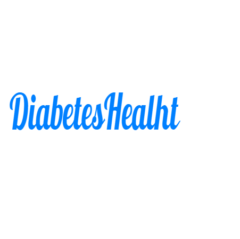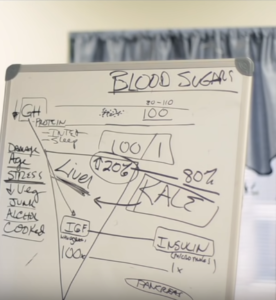Blood sugar levels. Very important to know, but very misunderstood if you have diabetes, if you have hypoglycemia, which is a low blood sugar level if you are concerned about preventing them.
This is how it works, the law of the body, is that no matter what the body should maintain a certain level of blood sugar, so the blood sugar level will call it glucose level. Now, if you want to know the unit, I think they are milligrams per deciliter, but do not worry about that, but there are blood analysis units where you can analyze your blood and it should be here, now it varies between 80 and 110, but if that blood the sugar goes up too well, that is called hyperglycemia, which means that diabetes is fine, if the blood sugar is too low, it is called hypoglycemia, so the goal for the body is to maintain blood sugar of 100, so you will do everything possible to eliminate the separated body, convert it and break down your muscle protein with one goal: maintain a normal level of blood sugar, so that almost everything you eat will eventually become glucose or sugar.
Even foods that are not sugar, even protein and fat, will break down. K Down and then you’re going to build it, the body will convert it back into sugar, so sugar is used as fuel and food for the cells, so the way it works is that you have this big organ here called liver, the liver. on the right side of his body is about 3 and a half pounds the size of a soccer ball and then we have this little organ right here, which is called pancreas, and it’s right here, right, under the left rib cage , now these two organs reciprocate and what I mean by that is that they have a mutual relationship that they coordinate and that control the blood. Sugar is fine, but the liver is the most ignored piece of the diabetes puzzle we will enter.
Is that how it works,
The liver controls the blood sugar when you are not eating and the pancreas controls the sugars in the blood when you eat well and move from one place to another, so what the pancreas does is that it produces a hormone. Insulin and basically what it does is that it eliminates sugar from the blood, so it eliminates it, it reduces blood sugar, so there are hormones that reduce sugar. It’s when you’re eating because you just ate and you’re The flood the blood with sugar, even if you do not eat sugar because everything turns into sugar, eventually now, when you’re not eating, we need to increase the sugar level for your liver to put sugar in the blood, so go inside. It’s fine, and it does it through a hormone that is very similar to insulin, but it does the opposite and they call it the insulin-like growth factor, so it’s an instant like that, but IGF does not care about that right now, just realize that there is a hormone that basically and where does the sugar get?
It is that it gets the sugar from two sources, one is the muscle and the liver, and that is basically well stored sugar, so, in other words, your body has stored sugar and the word for that is glycogen which is basically a lot of sugars are stored in the body, so you can use it well and also get it from fat, so those are the two sources you’re turning to, so obviously the goal is to be able to lose fat or take advantage of fat, but that that’s it.
The purpose of fat
It’s acting as a storage so you can use it when you’re not eating well, without hunger or exercising or fasting those things, so the lever basically removes that fat and turns it into sugar and returns all this blood sugar to keep those 100 , but first it goes after the store sugar, so this is number one and this is number two, so, in the presence of any stored sugar or any amount of sugar, this fat will not be used at all.
I like to burn fat in normal situations unless there is no sugar, that’s fine, so the way it works is simply that the pancreas regulates the sugar that extracts the sugar when you’re eating and then, when you’re not eating, the liver Start kicking in there and put the sugar back in and start taking this storage and start putting it back in the blood to keep a sugar level at 100.
Now let’s talk briefly about what happens when sugar is extracted from the blood when insulin increases well, so there are three situations, the most important:
1The energy of that sugar could be used as immediate energy let’s say you’re exercising, so you’ll be consuming your energy or doing a marathon in which the person eats sugar and is burning.
2- it is stored as sugar in that sugar stored in the liver and in the muscles, so we want that to happen because if it is stored, then it does not turn into fat, so I would rather have stored more sugar than fat because the stored sugar alone It will be used to obtain energy, but we do not want too much, so this is a certain amount of sugar that is stored in the body.
But to store this sugar right here, what happens is that you need good potassium, no potassium, can not store sugar, so, for every sugar, a small molecule. you need a molecule of potassium so potassium is like the glue that holds together, so, with low levels of potassium, the person will start to want sugar because they can not store sugar, that’s why sugars go down and the body He is saying Give me that sugar, so the symptom of cravings means that your body has a low blood sugar level and it is very low in potassium.
So what happens to people who have cravings? They are going to eat sugar. What they should consume is potassium. Now the problem that most people have. is that they really do not know the amount of potassium they need daily, an average body needs 4700 milligrams, that’s a lot, in fact, a banana is 400, so it would have to have 10 bananas that will not work, so we really need that our body needs 7 cups of vegetables every day, if you’re drinking one or two cups, you will not cut it and if you take a pill it’s like 40 milligrams, you should have about a hundred. So we want to make the vegetable so you can make the kale smoothie for breakfast as part of it and have the eggs you want and then for lunch have this great salad for dinner, have a little more vegetables, but really We want to shoot for 7 cups and if you are interested in managing or improving your blood sugar problems, you should do so, especially if you have diabetes, so we want to store sugar and also if there is a lot of sugar to extract and that sugars are not used. as energy and you do not have potassium, guess what it is that goes directly to fat, so it becomes fat, so that’s a relationship between potassium and fat. If you do not consume enough vegetables or potassium, you tend to gain more fat. that’s just those are the three things.
What happens when sugar goes after you consume sugar and the pancreas hormone insulin peak now the next point has to do with what diabetes is.
Diabetes is a condition in which your body can no longer regulate sugar here. and it’s because, obviously, consuming too much sugar is the common cause, but here’s the thing:
Type 2 diabetes is a less serious diabetes. Type 1 diabetes is more serious.

